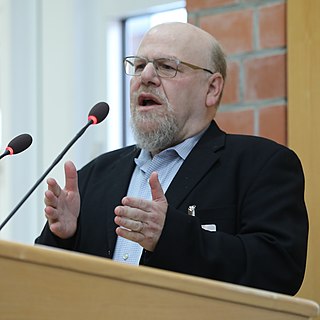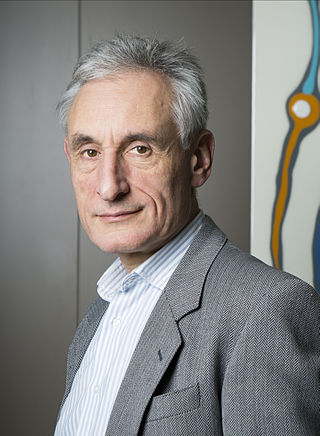
Alan Curtis Kay is an American computer scientist best known for his pioneering work on object-oriented programming and windowing graphical user interface (GUI) design. At Xerox PARC he led the design and development of the first modern windowed computer desktop interface. There he also led the development of the influential object-oriented programming language Smalltalk, both personally designing most of the early versions of the language and coining the term "object-oriented." He has been elected a Fellow of the American Academy of Arts and Sciences, the National Academy of Engineering, and the Royal Society of Arts. He received the Turing award in 2003.

Bjarne Stroustrup is a computer scientist, most notable for the invention and development of the C++ programming language. Stroustrup served as a visiting professor of computer science at Columbia University in the City of New York beginning in 2014, where he has been a full professor since 2022.
Information retrieval (IR) in computing and information science is the process of obtaining information system resources that are relevant to an information need from a collection of those resources. Searches can be based on full-text or other content-based indexing. Information retrieval is the science of searching for information in a document, searching for documents themselves, and also searching for the metadata that describes data, and for databases of texts, images or sounds.

Sir Charles Antony Richard Hoare is a British computer scientist who has made foundational contributions to programming languages, algorithms, operating systems, formal verification, and concurrent computing. His work earned him the Turing Award, usually regarded as the highest distinction in computer science, in 1980.
The UKeiG Strix award is an annual award for outstanding contributions to the field of information retrieval and is presented in memory of Dr Tony Kent, a past Fellow of the Institute of Information Scientists (IIS), who died in 1997. Tony Kent made a major contribution to the development of information science and information services both in the UK and internationally, particularly in the field of chemistry. The name 'Strix' was chosen to reflect Tony's interest in ornithology, and as the name of the last and most successful information retrieval packages that he created.

Samson Abramsky is Professor of Computer Science at University College London. He was previously the Christopher Strachey Professor of Computing at Wolfson College, Oxford, from 2000 to 2021.

Sir Andrew Hopper is a British-Polish computer technologist and entrepreneur. He is treasurer and vice-president of the Royal Society, Professor of Computer Technology, former Head of the University of Cambridge Department of Computer Science and Technology, an Honorary Fellow of Trinity Hall, Cambridge and Corpus Christi College, Cambridge.
The Gerard Salton Award is presented by the Association for Computing Machinery (ACM) Special Interest Group on Information Retrieval (SIGIR) every three years to an individual who has made "significant, sustained and continuing contributions to research in information retrieval". SIGIR also co-sponsors the Vannevar Bush Award, for the best paper at the Joint Conference on Digital Libraries.

James Alexander Hendler is an artificial intelligence researcher at Rensselaer Polytechnic Institute, United States, and one of the originators of the Semantic Web. He is a Fellow of the National Academy of Public Administration.

Philip Lee Wadler is a UK-based American computer scientist known for his contributions to programming language design and type theory. He is the chair of theoretical computer science at the Laboratory for Foundations of Computer Science at the School of Informatics, University of Edinburgh. He has contributed to the theory behind functional programming and the use of monads; and the designs of the purely functional language Haskell and the XQuery declarative query language. In 1984, he created the Orwell language. Wadler was involved in adding generic types to Java 5.0. He is also author of "Theorems for free!", a paper that gave rise to much research on functional language optimization.

Simon Peyton Jones is a British computer scientist who researches the implementation and applications of functional programming languages, particularly lazy functional programming.
Sir David Keith Peters is a retired Welsh physician and academic. He was Regius Professor of Physic at the University of Cambridge from 1987 to 2005, where he was also head of the School of Clinical Medicine.

Andrew Blake FREng, FRS, is a British scientist, former laboratory director of Microsoft Research Cambridge and Microsoft Distinguished Scientist, former director of the Alan Turing Institute, Chair of the Samsung AI Centre in Cambridge, honorary professor at the University of Cambridge, Fellow of Clare Hall, Cambridge, and a leading researcher in computer vision.

Moshe Ya'akov Vardi is an Israeli mathematician and computer scientist. He is the Karen Ostrum George Distinguished Service Professor in Computational Engineering at Rice University, United States. and a faculty advisor for the Ken Kennedy Institute. His interests focus on applications of logic to computer science, including database theory, finite model theory, knowledge of multi-agent systems, computer-aided verification and reasoning, and teaching logic across the curriculum. He is an expert in model checking, constraint satisfaction and database theory, common knowledge (logic), and theoretical computer science.

Karen Spärck Jones was a self-taught programmer and a pioneering British computer scientist responsible for the concept of inverse document frequency (IDF), a technology that underlies most modern search engines. She was an advocate for women in the field of computer science. She even came up with a slogan: “Computing is too important to be left to men.” In 2019, The New York Times published her belated obituary in its series Overlooked, calling her "a pioneer of computer science for work combining statistics and linguistics, and an advocate for women in the field." From 2008, to recognize her achievements in the fields of information retrieval (IR) and natural language processing (NLP), the Karen Spärck Jones Award is awarded to a new recipient with outstanding research in one or both of her fields.
Christopher W. Johnson, FRSE, FRAeS, FBCS, is a British computer scientist and Pro Vice Chancellor for Engineering and Physical Sciences at Queen's University, Belfast. Previously he was Professor and Head of Computing Science at the University of Glasgow, UK.

Chai Keong Toh is a Singaporean computer scientist, engineer, industry director, former VP/CTO and university professor. He is currently a Senior Fellow at the University of California Berkeley, USA. He was formerly Assistant Chief Executive of Infocomm Development Authority (IDA) Singapore. He has performed research on wireless ad hoc networks, mobile computing, Internet Protocols, and multimedia for over two decades. Toh's current research is focused on Internet-of-Things (IoT), architectures, platforms, and applications behind the development of smart cities.

Hanspeter Pfister is a Swiss computer scientist. He is the An Wang Professor of Computer Science at the Harvard John A. Paulson School of Engineering and Applied Sciences and an affiliate faculty member of the Center for Brain Science at Harvard University. His research in visual computing lies at the intersection of scientific visualization, information visualization, computer graphics, and computer vision and spans a wide range of topics, including biomedical image analysis and visualization, image and video analysis, and visual analytics in data science.
Shih-Fu Chang is a Taiwanese American computer scientist and electrical engineer noted for his research on multimedia information retrieval, computer vision, machine learning, and signal processing.
Gonzalo Navarro Badino is a full professor of computer science at the University of Chile and ACM Distinguished Member, whose interests include algorithms and data structures, data compression and text searching. He also participates in the Center for Biotechnology and Bioengineering and the Millennium Institute for Foundational Research on Data .. He obtained his PhD at the University of Chile in 1998 under the supervision of Ricardo Baeza-Yates with the thesis Approximate Text Searching, then worked as a post-doctoral researcher with Esko Ukkonen and Maxime Crochemore.













